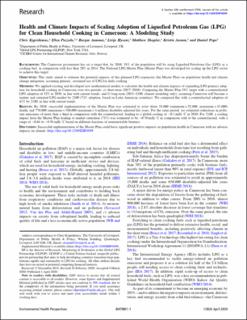Health and Climate Impacts of Scaling Adoption of Liquefied Petroleum Gas (LPG) for Clean Household Cooking in Cameroon: A Modeling Study
Kypridemos, Chris; Puzzolo, Elisa; Aamaas, Borgar; Hyseni, Lirije; Shupler, Matthew; Aunan, Kristin; Pope, Daniel
Journal article, Peer reviewed
Published version

Åpne
Permanent lenke
https://hdl.handle.net/11250/2767400Utgivelsesdato
2020Metadata
Vis full innførselSamlinger
- Journal articles [468]
Sammendrag
Background: The Cameroon government has set a target that, by 2030, 58% of the population will be using Liquefied Petroleum Gas (LPG) as a cooking fuel, in comparison with less than 20% in 2014. The National LPG Master Plan (Master Plan) was developed for scaling up the LPG sector to achieve this target. Objectives: This study aimed to estimate the potential impacts of this planned LPG expansion (the Master Plan) on population health and climate change mitigation, assuming primary, sustained use of LPG for daily cooking. Methods: We applied existing and developed new mathematical models to calculate the health and climate impacts of expanding LPG primary adoption for household cooking in Cameroon over two periods: a) short-term (2017–2030): Comparing the Master Plan 58% target with a counterfactual LPG adoption of 32% in 2030, in line with current trends; and b) long-term (2031–2100, climate modeling only), assuming Cameroon will become a mature and saturated LPG market by 2100 (73% adoption, based on Latin American countries). We compared this with a counterfactual adoption of 41% by 2100, in line with current trends. Results: By 2030, successful implementation of the Master Plan was estimated to avert about 28,000 (minimum=22,000, maximum=35,000) deaths and 770,000 (minimum=580,000maximum=1 million) disability-adjusted life years. For the same period, we estimated reductions in pollutant emissions of more than a third in comparison with the counterfactual, leading to a global cooling of −0.1 milli °C in 2030. For 2100, a cooling impact from the Master Plan leading to market saturation (73%) was estimated to be −0.70 milli °C in comparison with to the counterfactual, with a range of −0.64 to −0.93 milli °C based on different fractions of nonrenewable biomass. Discussion: Successful implementation of the Master Plan could have significant positive impacts on population health in Cameroon with no adverse impacts on climate. https://doi.org/10.1289/EHP4899
